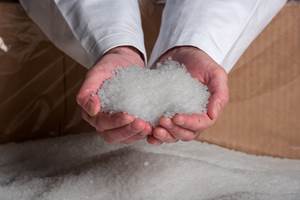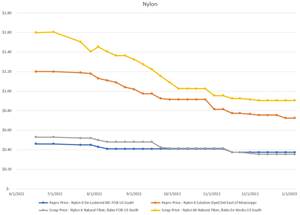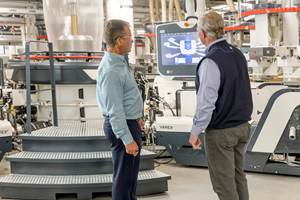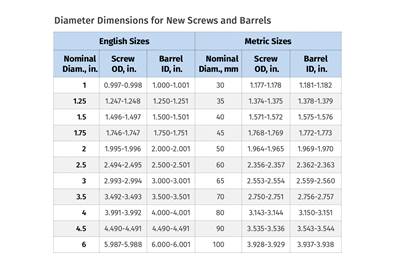Energy Prices Restrain Plastics' Recovery
In recent weeks, prices for crude oil and natural gas have risen to levels last seen just prior to the war in Iraq.
In recent weeks, prices for crude oil and natural gas have risen to levels last seen just prior to the war in Iraq. The most widely cited explanations for this are cold weather, geopolitical uncertainty, and a depreciating dollar. But whatever the reason, the rising costs are of particular concern to plastics processors because the costs of energy products will have a dramatic effect on processors' profits in the coming months.
There are several reasons for this. First, higher energy prices act like a tax on consumers. The more it costs people to heat their homes and power their cars, the less discretionary income they have for purchases of other goods and services. Second, rising prices for energy make it more expensive for manufacturers to run their factories and ship their products to market.
But the most significant impact on processors is that high costs for oil and natural gas result in corresponding increases in the prices of resins. For many processors, the cost of materials accounts for as much as 50% to 70% of the total cost of production. In the case of many types of low-margin, high-volume products (i.e., packaging), increases in materials costs can be devastating. But even higher-margin producers will suffer from lower profit levels when resins costs are high.
Compounding this problem is the fact that higher costs of production make manufacturers even more vulnerable to competition from low-cost foreign competitors. When profit levels are healthy, manufacturers can respond to increased competition with aggressive tactics such as lowering their own prices, increasing their levels of service, or investing in more efficient methods of production. When margins are thin, the options are limited to more drastic measures like decreasing production or service or halting operations completely.
The good news, at least for the short term, is that energy prices are cyclical. This means that periods of rising prices are always followed by periods of declining prices. The timing of these periods varies, but the cure for high prices is high prices, because they weaken demand. Typically, the higher the price goes, the quicker the turnaround. Our forecast calls for the trend in oil and gas prices to head downward for most of 2004. And though prices will not sink as low as they were two years ago, they will be substantially lower at the end of this year than they are now. This will allow resin prices to decline this year as well. On average, we expect resins prices to be 15% to 20% lower in 2004 than they were in 2003.
But while manufacturers can look forward to lower energy prices in the not-too-distant future, the longer-term outlook is less rosy. The U.S. economy is too dependent-addicted might be a better word-on voluminous amounts of inexpensive, foreign-produced energy products. And unfortunately, these are scarce commodities at the present time. Current inventory levels of natural gas, a feedstock for many types of plastic resins, are at or above historical averages. But this fuel is increasingly being used to supply our rising demand for electricity. So given the current market fundamentals, the cyclical downturns in the price of natural gas will be shallow and short-lived.
But as is the case in any crisis, there is an opportunity here as well as a threat. Because they are lightweight, durable, easy to produce, and can be good insulators, the increased use of plastics products is one of the keys to lowering our dependence on non-renewable, imported energy sources. And the processors who anticipate the coming changes in our patterns of energy consumption will likely find large and eager markets.
Processors can also contribute to their own cause by continuing to search out and aggressively implement programs that promote efficiency. Things like investment in new technology, lean manufacturing programs, employee training, and public-awareness campaigns are all tools that can increase a company's and a market's efficiency over time. And not surprisingly, these are also the methods that are currently being touted as the best strategies for dealing with rising competition from low-cost imported products.
Bill Wood, an independent economist specializing in the plastics industry, heads his own firm, Moutaintop Economics & Research, Inc. in Greenfield, Mass. He may be contacted by e-mail: BillWood@PlasticsEconomics.com
Related Content
‘Monomaterial’ Trend in Packaging and Beyond Will Only Thrive
In terms of sustainability measures, monomaterial structures are already making good headway and will evolve even further.
Read MoreRecycled Material Prices Show Stability Heading into 2023
After summer's steep drop, most prices leveled off in the second half.
Read MorePregis Performance Flexibles: In the ‘Wow’ Business
Pregis went big and bold with investment in a brand-new, state-of-the-art plant and spent big on expanding an existing facility. High-tech lines, well-known leadership and a commitment to sustainability are bringing the “wow” factor to blown film.
Read MoreResins & Additives for Sustainability in Vehicles, Electronics, Packaging & Medical
Material suppliers have been stepping up with resins and additives for the ‘circular economy,’ ranging from mechanically or chemically recycled to biobased content.
Read MoreRead Next
Troubleshooting Screw and Barrel Wear in Extrusion
Extruder screws and barrels will wear over time. If you are seeing a reduction in specific rate and higher discharge temperatures, wear is the likely culprit.
Read MorePeople 4.0 – How to Get Buy-In from Your Staff for Industry 4.0 Systems
Implementing a production monitoring system as the foundation of a ‘smart factory’ is about integrating people with new technology as much as it is about integrating machines and computers. Here are tips from a company that has gone through the process.
Read More























